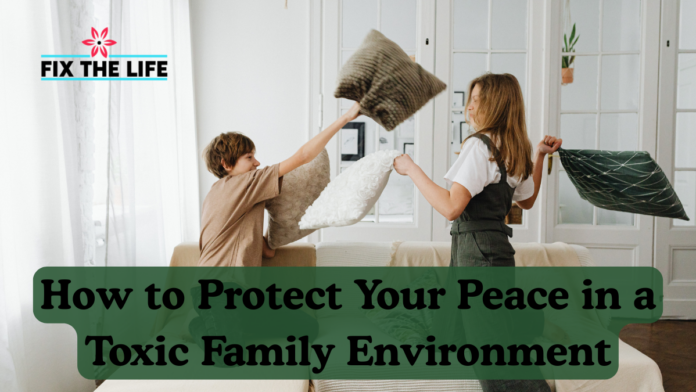Family relationships can be incredibly fulfilling, but they can also be emotionally draining when toxicity is present. Whether it’s manipulation, criticism, or unhealthy dynamics, protecting your peace becomes essential for maintaining emotional well-being.
This guide explores how to protect your peace in a toxic family, ways to set emotional boundaries, and practical steps for handling family drama without sacrificing your mental health.
Why Family Can Be Emotionally Draining
Unlike friendships, where you can choose who remains in your life, family connections often come with lifelong ties. This makes dealing with toxic behavior especially complex, as emotional attachments can create guilt, obligation, or pressure to tolerate negativity.
Common Signs of a Toxic Family Environment:
- Constant Criticism & Dismissive Behavior – Minimizing feelings or accomplishments
- Manipulation & Control – Guilt-tripping or making decisions for you
- Emotional Neglect – Lack of support, empathy, or appreciation
- Frequent Conflict & Drama – Arguments, passive-aggressiveness, or unhealthy communication
If these patterns persist, creating emotional boundaries becomes essential for self-preservation.
1. Set Firm Emotional Boundaries
Boundaries define what behavior you will and won’t tolerate. They help you preserve your mental space without cutting off family entirely (unless necessary).
How to Set Boundaries Without Guilt:
- Identify what drains your peace – Is it conversations, certain individuals, or specific behaviors?
- Communicate clearly – Express limits like, “I won’t discuss this topic anymore.”
- Limit exposure – Reduce interactions with individuals who cause stress.
- Stay firm in your choices – You don’t owe explanations for prioritizing your well-being.
Setting boundaries is a self-care practice, not a rejection of family.
2. Manage Toxic Conversations with Detachment
Toxic relatives often provoke emotional reactions—whether through criticism, passive-aggression, or unsolicited advice. Detaching emotionally helps prevent their words from influencing your mental state.
How to Handle Negative Conversations:
- Stay neutral – Avoid escalating conflicts by responding calmly.
- Use minimal responses – Simple phrases like “I hear you” or “I don’t agree” shut down negativity.
- Exit when necessary – If conversations turn toxic, physically remove yourself.
Choosing peace over engagement ensures you don’t absorb unnecessary stress.
3. Stop Seeking Approval or Validation
Toxic family dynamics often make individuals crave approval or try to prove their worth. Recognizing that some people will never acknowledge your value allows you to detach from validation-seeking behaviors.
Ways to Stop Seeking Family Validation:
- Accept that not everyone will support you – Their lack of approval does not reflect your worth.
- Define success for yourself – Focus on your values rather than external expectations.
- Limit discussions about personal growth – Some relatives may downplay achievements—share wisely.
Freedom from external validation strengthens self-confidence.
4. Prioritize Self-Care & Inner Healing
Protecting peace is not just about avoiding toxicity but actively cultivating inner strength through self-care.
Self-Care Strategies for Emotional Protection:
- Practice mindfulness – Meditation or deep breathing to regain emotional balance.
- Engage in uplifting activities – Hobbies, nature walks, or creative outlets.
- Surround yourself with supportive people – Choose friends who uplift rather than drain energy.
- Seek therapy or counseling – Professional guidance helps heal emotional wounds.
Taking care of yourself strengthens resilience against negativity.
5. Learn When to Distance Yourself Completely
Sometimes, cutting ties—whether temporarily or permanently—is necessary for emotional survival. If toxicity reaches a point of severe emotional harm, stepping away may be the healthiest choice.
When to Consider Distancing:
- Physical, emotional, or verbal abuse
- Repeated disrespect or manipulation despite setting boundaries
- Mental exhaustion that affects daily life
It’s okay to love family from a distance if staying connected causes damage.
FAQs
Q1: How do I set boundaries with toxic family members without feeling guilty?
Recognize that boundaries are about protecting yourself, not rejecting family. Guilt fades when you prioritize emotional health.
Q2: Is it okay to limit interactions with certain family members?
Absolutely, Not all family relationships need constant engagement—limiting exposure can improve mental well-being.
Q3: How can I avoid being emotionally manipulated by a toxic relative?
Recognize gaslighting, guilt-tripping, or pressure and respond with firm boundaries and emotional detachment.
Q4: Can toxic family relationships improve over time?
Some family dynamics can shift through therapy or open conversations, but others may remain toxic. Assess patterns before investing in change.
Q5: What if cutting ties with family is my only option?
While difficult, choosing peace over toxicity is sometimes necessary. Focus on creating a supportive circle beyond family.
Final Thought
Navigating how to protect your peace in a toxic family requires intentional boundary-setting, detachment from drama, and prioritizing emotional well-being. Whether limiting interactions, choosing self-care, or distancing completely, your peace deserves protection. No one should have the power to disrupt your mental health, and reclaiming control ensures you can move forward without unnecessary emotional strain.




